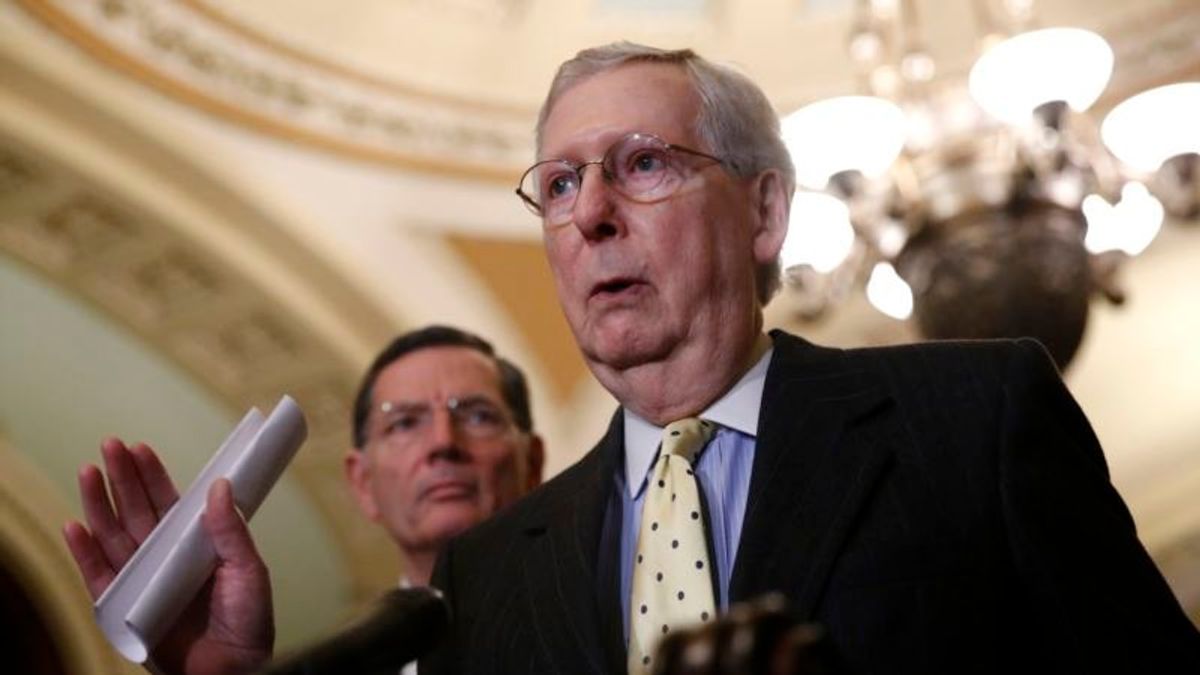
US Senate Leader: Time to Move on From Mueller Report
US Senate Leader: Time to Move on From Mueller Report

WASHINGTON —
U.S. Senate Republican leader Mitch McConnell says it is time for lawmakers to move on from the lengthy investigation of Russian meddling in the 2016 presidential election, despite House Democrats' expansive efforts to investigate President Donald Trump and his administration.
"Case closed," McConnell said on the Senate floor. He derided what he said was the "outrage industrial complex" of Democrats and television news show pundits over special counsel Robert Mueller's conclusion that Trump did not collude with Russians to help him win.
"The investigation went on for two years," he said. "It's finally over."
Mueller's report remains at the center of a dispute in the Democratic-controlled House of Representatives. Congressman Jerrold Nadler says the House Judiciary Committee he heads will vote Wednesday on whether to hold Attorney General William Barr in contempt for refusing to turn over an unredacted copy of the 448-page report.
Nadler, however, says he will meet with officials from the Department of Justice as the two sides work to resolve the dispute over whether lawmakers can see the unfiltered report, or at least a large portion of it.
"It remains vital the committee obtain access to the full, unredacted report and the underlying materials," Nadler said in a statement late Monday. "The committee remains committed to finding a reasonable accommodation."

The action by Nadler toward a contempt of Congress vote against Barr marked another escalation of the rancor by the Democrat-controlled House of Representatives against Trump, a Republican, and his administration.
On Monday, Treasury Secretary Steven Mnuchin rejected the demands of another House committee for six years of Trump's personal income tax returns. In addition, House Democrats are pushing to have Mueller testify about his handling of the investigation and also Donald McGahn, the former White House counsel, about his dealings with Trump.
Barr has said he had no objection to letting Mueller testify before Congress about his investigation. But Trump on Sunday changed his mind, saying, "Bob Mueller should not testify. No redos for the Dems!" No agreement has been reached for Mueller's testimony.
Barr last month released a redacted copy of the Mueller report, with the prosecutor concluding neither Trump nor his campaign colluded with Russia, but reached no conclusion whether Trump, as president, obstructed justice during the 22-month investigation. Barr decided the findings did not warrant obstruction charges against the president.
In an online statement Monday under the name DOJ Alumni, more than 450 former federal prosecutors who worked in Republican and Democratic administrations said evidence Mueller uncovered would have resulted in obstruction charges against Trump, were it not for the long-standing Justice Department policy that a sitting president cannot be charged with a criminal offense.
The former prosecutors said each of them "believes that the conduct of President Trump," absent the Justice Department policy, would "result in multiple felony charges for obstruction of justice." They said to suggest a prosecutor could not win such an obstruction case against Trump "runs counter to logic and our experience."

The redacted report Barr released included dozens of instances of missing material, information he said dealt with secret grand jury testimony and other sensitive material. One analysis found that about 7% of the report was redacted, with the most material deleted about Russian attempts to influence the election by posting false and misleading material on American social media accounts and Russia's role in hacking top Democrats' emails and releasing them to the public.
Nadler says his committee is entitled to see what was redacted, but the Justice Department said last week the panel's request for the information was "not legitimate oversight" and an "overboard and extraordinarily burdensome" request.
If the Democrat-controlled Judiciary Committee approves the contempt citation, it would be taken up by the full House of Representatives. In theory, someone held in contempt could eventually be tried and, if convicted, face up to a year in prison. The Justice Department rarely pursues such referrals from Congress.
The top Republican on the Judiciary Committee, Congressman Doug Collins, condemned Nadler's move to hold Barr in contempt.
"They know the Justice Department is working to negotiate even as they pursue contempt charges, making their move … illogical and disingenuous," Collins said. "Democrats have launched a proxy war smearing the attorney general when their anger actually lies with the president and the special counsel, who found neither conspiracy nor obstruction."
Barr last week testified before a Senate committee about his role in overseeing the last stages of the Mueller investigation, but refused to testify before Nadler's panel in a dispute over whether the committee's staff attorneys would be allowed to question him.
 Gillibrand Says She’ll Only Pick Judges Who Back Roe v. WadeNext PostRepublican Senators to Be Briefed on White House Immigration Plan
Gillibrand Says She’ll Only Pick Judges Who Back Roe v. WadeNext PostRepublican Senators to Be Briefed on White House Immigration Plan
THE REAL STATE OF THE UNION TONIGHT AT 7PM ET.
Record Stock Market highs. Border secured. Cartels crushed. “America is back.” This is MUST-SEE TV. Wall-to-wall LIVE team coverage starts TUESDAY at 7PM ET on the RAV network!







